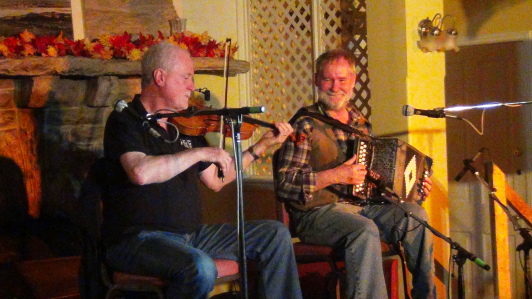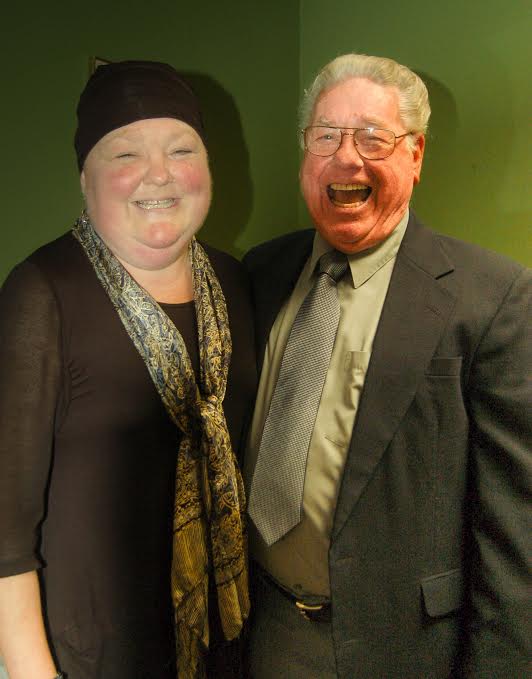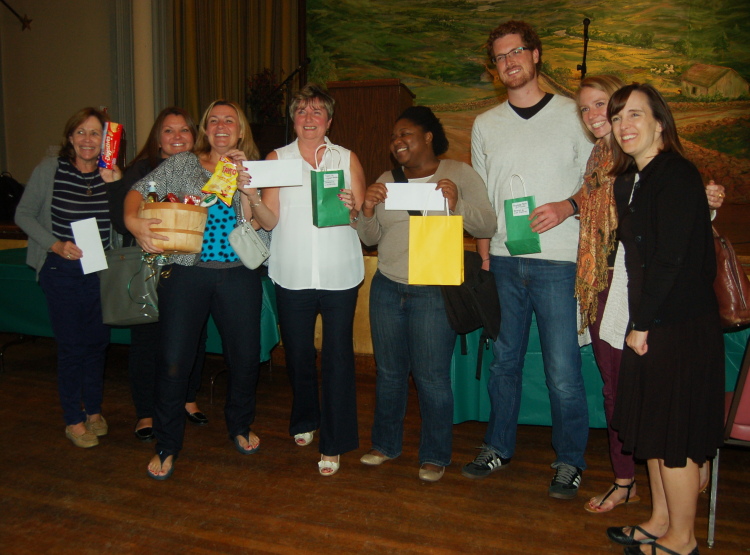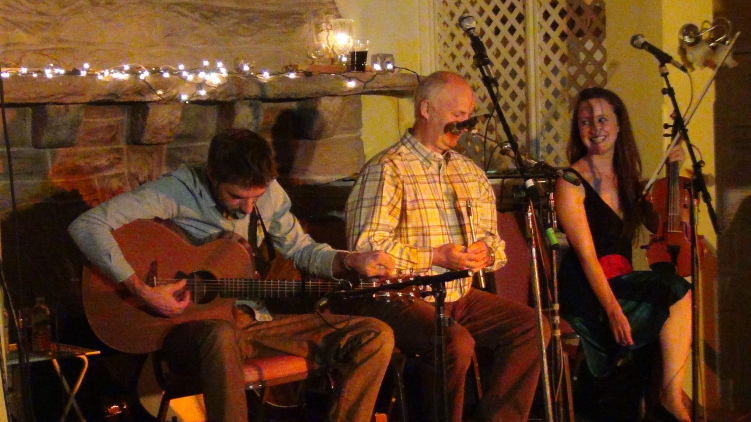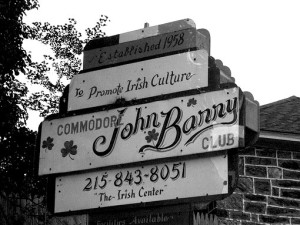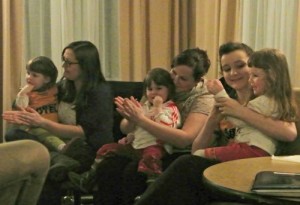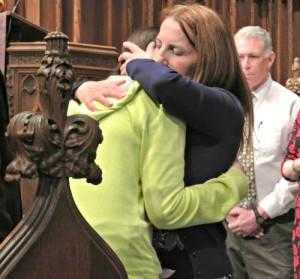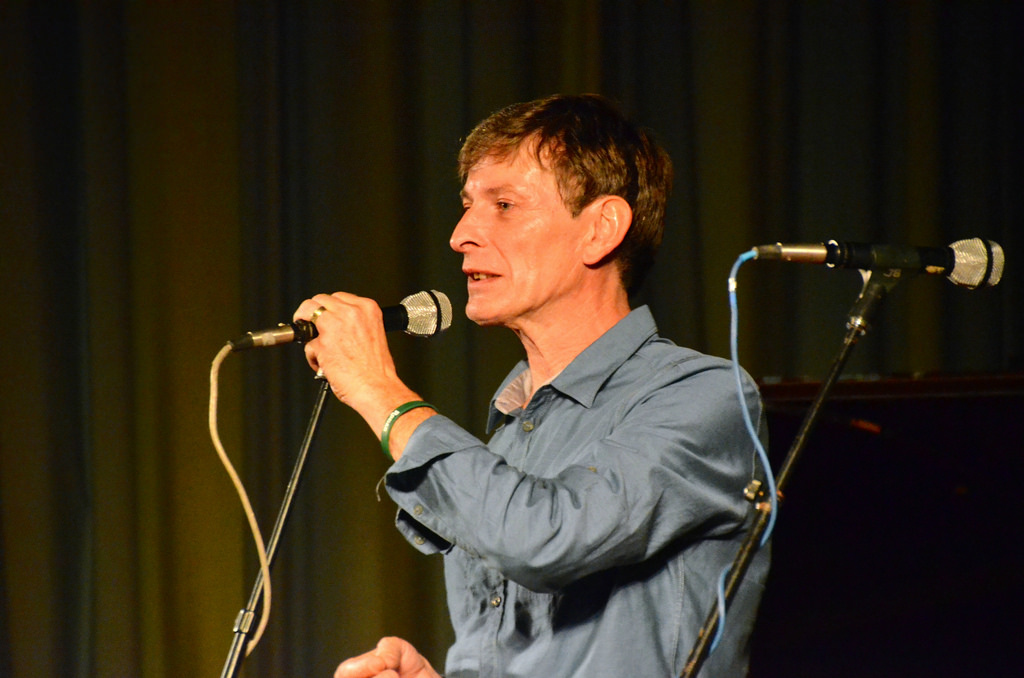
“I don’t really know much about singing. I don’t know an awful lot about songs. I’ve just been at it all my life.”
While the third part of that statement is undeniably true, anyone who heard Sean Keane sing at the Philadelphia Ceili Group’s 40th Annual Festival, or attended his rarely given singing workshop at the Irish Center this past Saturday, would be quick to argue the first two points.
The Keane Family of Caherlistrane, County Galway, has long been recognized and revered for not only their own musical talents, but for their role in preserving the songs and tunes of Ireland when the old ways were changing, when “the people wanted to shed that era of the darkness…and the music was being thrown out with a lot of the antique furniture and the thatched houses, and it wasn’t acceptable in a lot of the pubs.”
Sean, the youngest of the seven siblings in his generation, became aware at a very young age that he was part of a family steeped in music.
“By the time I was born, and by the time I was old enough to become aware of my surroundings, my grandmother’s house was well established as a place where musicians and singers would have been coming for a long, long time to play songs and tunes. I grew up in a house of music. When I was maybe six years of age, I became aware of being in a family that had singing going on. I remember it as vividly as if it happened this morning. It was a summer’s day, and I was running through my grandparents’ house and there was an old man—well, he seemed old to me because I was so young—and he was sitting with my grandmother. And she was writing out a song. She collected songs from all sorts of people. A lot of different people would come to visit the house and and she would exchange songs and tunes with them. As a result of it, when she passed away, or even before she died, if we were looking for a song, she had a big old brown leather suitcase and it was just full of handwritten songs. It was a great source of material for us.”
But on that particular summer’s day, Sean’s grandmother, Mary Costellow Keane, was arguing with the man over the words of the song he was dictating to her. It stopped Sean in his tracks, and he listened as his grandmother said, “I’m not writing that down. It’s not right.” And the singer pushed back, “Will you write it down, woman, I’m telling you ’tis right.” But Mary Keane crumpled up the paper she’d been writing on, and threw it into the fire. And Sean thought, “Wow, that’s that.” But what stuck with him were the lines they were arguing about. “I don’t know why those lines would have any kind of influence on a six year old, but it was ‘I had seven links upon my chain, For every link a year, Before I can return again, To the arms of my dear.’ Just those lines, I never forgot them.”
That song was “Erin’s Lovely Home,” and Sean ended up recording it on his first album.
It was right after he became aware of the kind of singing that surrounded him that he entered his first Fleadh Cheoil being held in the nearby town of Tuam. The song he chose was “The May Mountain Dew” and he won. He continued on competing and winning, and it took him to Dublin. And then he was hooked: “Travel was the the one thing that attracted me to the competitions because I’d get to different towns and so on and that was great. The excitement of actually going to a new town—that would give me the boost to to sing and to learn new songs—and to get better and to hone it. I thought if singing a traditional song could bring me to Dublin, I’m going to learn them all.”
He went on to win thirteen consecutive All-Irelands before the draw of being a teenager caught up with him, and though he stopped competing, he never stopped singing, or absorbing the music that enveloped him.
His aunts, Sarah and Rita Keane, “they had something unique going on as well. When they used to sing together, it was in unison—not using harmonies, but singing along in unison. And that was a bit unusual at the time, and I suppose it kind of is unusual because traditional songs are so personal and your ornamentation and the way you would sing it, and the phrasing, is a very personal thing. But they just knew the way each other would sing the song…It set them apart. They generally sang together and that’s why they became Rita and Sarah—you never hear one mentioned without the other. But Mary, their other sister, used to sing with them as well. So there were three of them singing the one song in unison and it sounded like one voice all the time.”
Sean also played with his family’s Ceili Band, Keane’s Ceili Band. He started out playing the flute and whistle during summer holidays, sitting behind the others learning tunes and just playing away. His father sang and played the accordion and drums. Rita played the accordion. Sarah played the fiddle. One uncle also played the accordion and another played flute, and Mary sang. “They had different roles in the band, but they all sang and they all played. They would have been brought round to any weddings, christenings, funerals—any kind of occasion that was in the area. They were kind of the musicians of the area. They would always play, and there was never any money exchanged hands. It was never about that. It was my grandmother’s motto that you don’t get paid for a God given gift. It’s your gift and you’re meant to share it and you don’t charge for that. Because we’d be at this whether we got paid or not—that was the attitude I was given, and that’s the attitude I’ve kind of maintained.”
At 17, like many of his generation, Sean left Ireland for London, but not for singing. “I went over there working. In Ireland at that time, we all had to emigrate. The way I put it, there weren’t enough stones on the road to kick for us all. I was an engineer, and did a load of other things in my life as well. I’ve always been working with my hands. And I enjoy that as well. I’ve done a bit of everything—engineering, steel fabrication, building houses, digging holes in London, woodworking. I love woodworking and I still have my workshop at home where I do little bits for myself and little bits for friends.”
After a few years, he returned home, but soon after began touring professionally with the London based band, called She Gui, which in English is Fairy Wind. “A fairy wind,” Sean explained, “is on a summer’s day, you see little leaves or bits of particles of dust rising in the air like a little tornado. On a summer’s day in Ireland, you’ll see it in the hay fields, and you’ll see little wisps gathering in one place like a tiny twister. And they call that a fairy wind.” The band toured a lot in Europe, in England, and then in Ireland. But after about two years, most of the band was ready to move on, and Sean later joined up with the band Reel Union along with his sister Dolores, her then-husband John Faulkner, Mairtin O’Connor and Eamonn Curran.
He stopped playing music professionally when he got married. “We had a child, and a new home and a mortgage, and all the rest of it. So I was just out working. It was my wife, Virginia, who encouraged me to sing. She said, ‘You need to record an album and do this because it’s really what you should be doing.’ And I said ‘Well, I will, if you manage me.’ And she was a schoolteacher, and said, ‘Well, I don’t know anything about music and the management.’ And I said, ‘Well, I’ll teach you the little bits I know.’ So we went from there. She was my manager for 22 years. She passed away four years ago.”
“It was a very short time after Virginia passed away and the phone was ringing with managers saying ‘Oh, we’ll look after your work, and oh, we’ll do this and we’ll do that.’ But I didn’t want to do that. So I stopped for a few years.”
The break, however, is over. Sean got a new manager last year, and this past December he recorded a new album called “Never Alone.” It’s a 45 track, 3-pack CD of some of the songs he’s recorded over the years, as well as six new songs.
“I went back at it last year. Johnny B. Broderick wrote a song he wanted me to record, called ‘Paint Me a Picture of Ireland.’ And we did it for The Gathering that was last year, and released it. Johnny was the manager of a special needs center in Ireland, and that’s how I got to know him. I used to go in there and sing songs, and he’d give me a ring and say, ‘Sean, come in and do a few songs’ and I’d do that a few times a year. He’s also a poet and when he wrote ‘Paint Me a Picture of Ireland,’ I knew there was something to this song. And Johnny is now my manager. I asked him, “Johnny, would you be my manager?’ And he said, ‘Manager? I know nothing about managing music.’ And like with Virginia, I said, ‘Well, I can guide you.’ So, he’s doing it now, and I love working with him.”
“This new CD is like the end of an era, and the beginning of an era. I decided to take a compilation of all the stuff we had up to that time, and then also on it are the new songs. I recorded the Beyonce song ‘Ave Maria’ and Dylan’s ‘Make You Feel My Love.’ They’re not traditional songs, but they’re just songs that I love to sing. I don’t care where they come from—what genre they are or anything else. I don’t like to analyze it too much, but it’s like the soul of the song. If you get into the soul of the song, and present it that way—and that’s where I receive it so I think that’s what people receive when they listen to it. You can have your words and your melodies and everything else, but it’s where it comes from when you’re singing that’s the important thing. It’s as simple as that.
“The title track, ‘Never Alone,’ is a track I got from a guy named Colm Kirwan. He lives down in Nashville now, and he’s the son of Dominic Kirwan who’s a well-known singer in Ireland. Colm is writing songs, but he sang that song, which is a Lady Antebellum song, one night in Nashville at a place we play called McNamara’s. It’s loosely based on the old Irish Blessing, ‘May the road rise up to meet you,’ and I thought, ‘God, there’s another song I want to sing.’
“I have my own recording studio, but now I record with my guitar player, Pat Coyne, and he has a studio called Mountain View Studios in the mountains of Connemara. And we just go back there and and we sit in and we record. When I go home from this tour, I’m recording a Christmas album—or maybe slightly, loosely based on Christmas. I’m hoping to have it out this year.
“So now I’m back at it again with as much enthusiasm as I’ve ever had for music, which is a great thing. I’m glad to have that back. It’s the most important thing. I suppose those few years have left me treating the love for what I do as even more precious than I ever did before. It’s just as my grandmother said, if you have a gift that you’ve been given, you cannot sit around with it—you have to go and use it. I think that applies for everybody, no matter what you do. So that’s what I’m doing. I’m just trying to keep up to the gift that I was given, bring it to wherever it’s going to go and enjoy every minute of it.”
And that is the legacy of the Keane family from Caherlistrane living on.
Follow Sean Keane on Facebook
Watch the video of The May Morning Dew
Watch the video of the title track from Sean’s new CD Never Alone
Watch the video of Sean singing Home
Watch the video of Paint Me a Picture of Ireland

